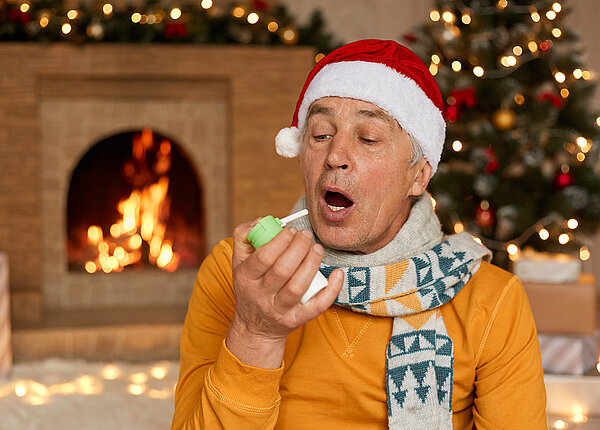English for PTA
COUGHS
Seite 1/1 5 Minuten
However, if coughing becomes chronic it can interrupt sleep, and, in severe cases, cause vomiting, light-headedness, and even rib fractures. A chronic cough is one that lasts eight weeks or longer in adults, and up to four weeks in children. While it can sometimes be difficult to pinpoint the exact cause, the most common causes are: tobacco use, postnasal drip syndrome, asthma, and acid reflux. A chronic cough may include the following signs and symptoms: frequent throat clearing or sore throat, hoarseness, wheezing and shortness of breath, and heartburn or a sour taste in the mouth.
PTA: Guten Tag.Yes, I do. What can I do for you?
I have had this persistent cough since just before Christmas. And I have tried a few home remedies, but nothing seems to help.
Could you describe your cough for me, please?
Certainly, it comes very suddenly, and it is so bad that I sometimes have shortness of breath.
Does it bother you more during the day, or do you find yourself waking up coughing during the night?
Initially it was just during the day, but for about four or five nights now it’s been waking me up, and frankly, it’s exhausting me.
Did you have a cold or flu at any time in the last few weeks?
I had a bit of a cold between Christmas and New Year, but I got over it quite quickly. I didn’t go to the doctors, as they are not taking patients with COVID-19 symptoms. And cough is one of them. Don’t worry, I had a test just last week and, thankfully, I tested negative. My wife and kids were okay too.
That’s good! Is your nose still, maybe, a little runny, you know do you have the feeling of liquid going into the back of your throat when you are sleeping? Especially when, as you said, you wake up in the night?
That’s it exactly!
I believe you might have something called postnasal drip syndrome!
Oh, that sounds serious.
Thankfully, it isn’t. It happens when your nose, or sinuses produce extra mucous, which is often the case in colds, and allergies. It’s quite common at this time of the year, and in spring and summer when pollen is at its highest.
What do you recommend?
I can recommend this saline nasal spray. This will help to flush out the excess mucous. And I also recommend nasal irrigation.
Nasal irrigation! That is not very pleasant, is it!
Not really, but it is great at flushing mucous, bacteria, and any other irritants.
Okay! I’ll try it, anything for a good night’s sleep!
If the symptoms don’t improve in three or four days, please, go to a doctor.
Thank you, I will. Bye, bye.
Good bye.
You can find this article on page 48 in DIE PTA IN DER APOTHEKE 01/2021.
Catherine Croghan, Lecturer in English and native speaker
Vocabulary
| cough | Husten |
|---|---|
| common knowledge | allgemein bekannte Tatsachen |
| protective mechanism | Schutzmechanismus |
| mucous | Schleim |
| foreign bodies | Fremdkörper |
| upper airways | obere Atemwege |
| interrupt | unterbrechen |
| severe cases | schwerwiegende Fälle |
| vomiting | Erbrechen |
| light-headedness | Benommenheit |
| pinpoint | präzise |
| postnasal drip syndrome | Postnasal-Drip-Syndrom |
| hoarseness | Heiserkeit |
| wheezing | Pfeifatmung |
| shortness of breath | Kurzatmigkeit |
| heartburn | Sodbrennen |
| persistent | hartnäckig, anhaltend |
| home remedies | Hausmittel |
| exhausting | ermüdend, anstrengend |
| sinuses | Nebenhöhlen |
| saline nasal spray | salzhaltiges Nasenspray |
| flush out | durchspülen |
| nasal irrigation | Nasenspülung |
| irritants | Reizstoffe |












